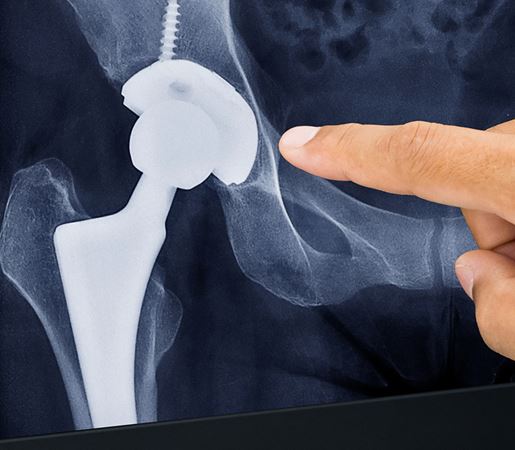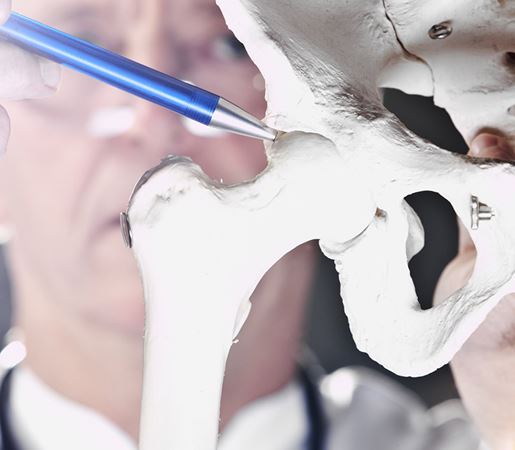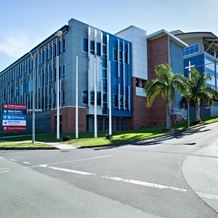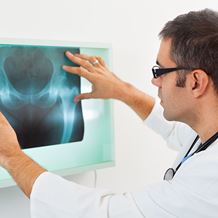Hip Replacement Surgery in Brisbane
- Home
- Services
- Orthopaedics
- Hip Orthopaedics
- Hip Replacement
- Hip Replacement Surgery in Brisbane
Hip replacement surgery in Brisbane
Total hip replacement and other hip surgeries are widely available in Brisbane at St Vincent’s Hospital Northside, a hospital where over 35,000 patients are treated every year across nine different operating theatres. Internationally renowned for delivering world-leading orthopaedic care, our highly experienced specialist teams are committed to innovation, medical research and optimal patient outcomes. With exceptional operating facilities on site including a new hybrid-operating theatre that supports advanced medical imaging and minimally invasive procedures, there is no better hospital in Brisbane to receive your care.
Total hip replacement surgery
Total hip replacement surgery, sometimes referred to as hip arthroplasty, is considered one of the most successful surgeries ever developed in modern medicine. With numerous St Vincent’s orthopaedic surgeons operating at Brisbane’s Northside alone, this standard procedure is now one of the most commonly performed surgeries across the whole of Australia.
The hip is one of the body’s largest weight-bearing joints and works just like a ball and socket where the thigh bone (femur) meets the pelvis (acetabulum). Over time, the hip joint can become vulnerable to injury or disease such as osteoarthritis and as we age, the protective cartilage gradually wears away, leaving the bones exposed. Extreme pain, swelling and stiffness can occur when the bones rub up against each other. For patients suffering from arthritic hip pain that is no longer responding to traditional therapies, total hip replacement surgery is an effective way to significantly reduce pain and restore mobility and function to the hip joint. Whilst this condition is more common in older patients aged over 50, hip replacement surgery can be performed at all ages.

- Jump to:
- Hip replacement recovery
The procedure
Hip replacement surgery uses advanced surgical techniques to repair the hip joint by replacing any damaged parts with artificial implants. During surgery, the ball-shaped femoral head at the top of the thigh bone is removed and replaced with an artificial ball and stem, usually made of metal or ceramic. The damaged surface of the socket is removed and replaced with a ceramic or plastic spacer, and the joint is tested for stability and flexibility. Physical balance is also checked to prevent later issues with unequal leg length. The operation itself usually takes around 2-3 hours, with a further 3-4 days spent recovering in hospital. Patients are encouraged to move around soon after surgery as this is known to aid the recovery process, and physiotherapy will continue either at home or onsite as part of a personalised rehabilitation program. A full recovery can take up to one year.

Surgical approaches
New procedures and emerging technologies are developing all the time, supported by ongoing research and development here at Brisbane’s Northside. However, not all techniques are suitable for all patients. The two most commonly used approaches for hip surgery are the posterior approach (where the joint is accessed through the back of the femur) and the direct anterior approach (where the joint is accessed from the front). The anterior hip replacement is gaining in popularity as it avoids cutting major muscles, but there is no research to suggest one approach is better than another in the long term and your hip surgeon will discuss with you individually which procedure will achieve the best results.
Some patients may be eligible for minimally invasive hip surgery which uses smaller incisions and is becoming more common. Advantages to this procedure include reduced pain and a quicker recovery. There are many factors to help your doctor determine if you are a suitable candidate including age, weight and general health.
Other types of hip replacement surgery
There are a number of conditions that can cause hip pain and your doctor will perform a series of tests such as a hip arthroscopy to diagnose the problem. From here you can discuss possible treatment options that may include:
Total hip replacement surgery addresses injury or disease that affects both parts of the hip joint. This more minor surgery is often recommended if you have suffered an injury to the ball-shaped femoral head but the socket area of your hip joint remains healthy. It is not usually considered an appropriate treatment for degenerative arthritis. During partial hip replacement surgery, the femoral ball at the top of the thigh bone is removed and replaced with an artificial part. This type of surgery is often used to repair hip fractures and is performed as a minimally invasive procedure. Advantages of this include a reduced surgery time, less pain and a quicker recovery.

Over time, some of the artificial parts that have been used in hip replacement surgery may fail through loosening, infection or general wear and tear. As a result, this procedure can vary from minor adjustments through to a more complex procedure that requires considerable planning. A return of some familiar aches and pains can be an indication that revision hip surgery is required – particularly if your hip surgery was performed some 15-20 years prior. Your specialist will conduct some routine tests to determine the exact cause.
If a total hip replacement is recommended on both sides of the body, it can be carried out simultaneously or as a staged procedure. This is also known as bilateral surgery. Advantages of the simultaneous bilateral procedure include one operation, one anaesthetic and one recovery time. However, there are additional risks involved with a longer surgery alongside some disadvantages that include more time in hospital and possibly an extended recovery period. The staged procedure usually requires around 3 months between surgeries.


Can Medicare help with my hip surgery in Brisbane?
The cost of your surgery is dependent on a number of factors that will vary by patient, including your level of private health insurance and the cost of your Brisbane surgical team, which can vary between specialists. Find out more about your Medicare rebate here.
What else should I consider?
Going into hospital can be a stressful experience, but at St Vincent’s Northside our aim is to offer you the best possible care right from your initial consult through to treatment and recovery. Achieving the very best patient outcomes sits at the heart of everything we do.
Find out more by booking a specialist consultation today.

Related Content

Total Hip Replacement
This surgery replaces the damaged parts of your hip with artificial materials.
Read More
Orthopaedics at St Vincent’s Private Hospital Northside
Providing a complete adult orthopaedic and trauma service.
Read More
Hip Orthopaedics
We provide specialist care and expertise for a range of problems affecting your hips.
Read More